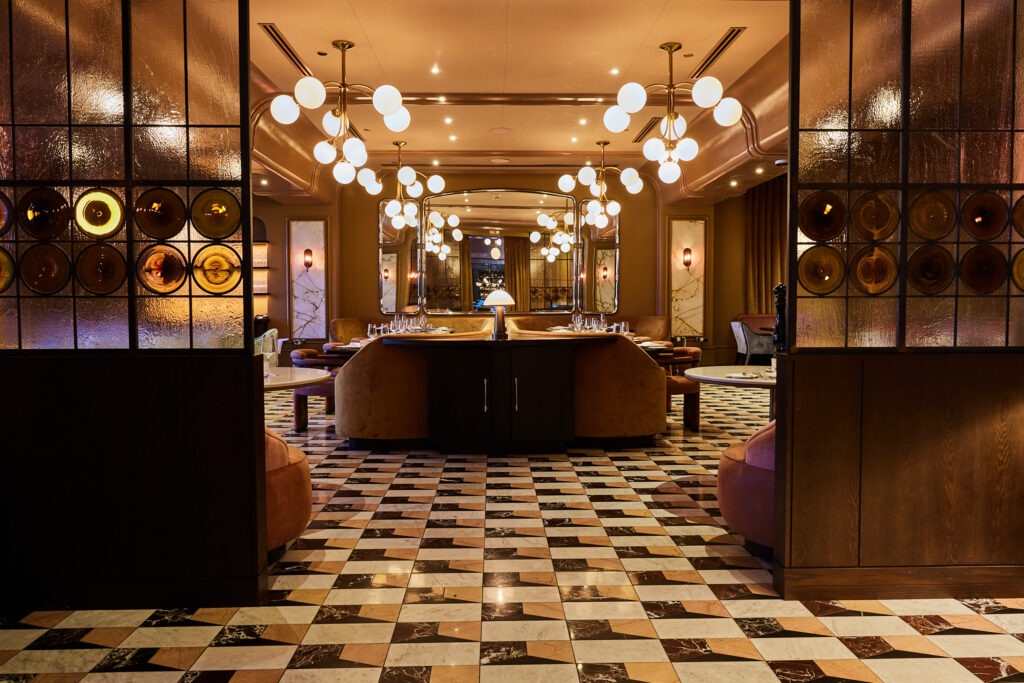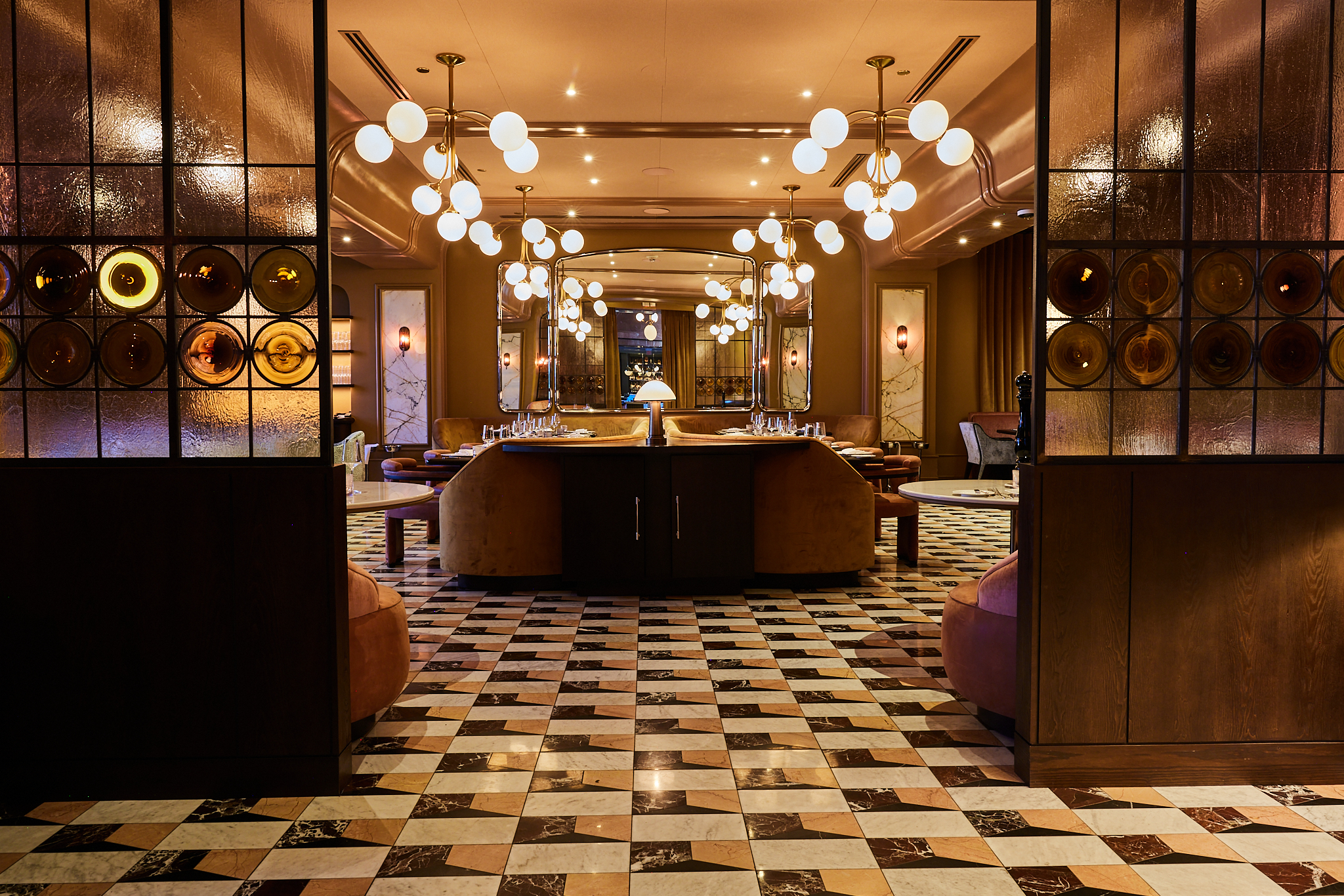Mastering (and then Marketing) French Cuisine at Brasserie Margot
Brasserie Margot isn’t just a restaurant—it’s an experience. Chef John Novak joins Marketing Mad Men to talk about the business of hospitality, crafting unforgettable dining experiences, and how his global upbringing shaped his culinary philosophy. We explore how French cuisine is misunderstood, the power of a well-curated cocktail and wine program, and what it takes to market a restaurant in a competitive city like Atlanta. Plus, key insights on food trends, hotel dining, and industry secrets you won’t want to miss!
🎧 Key topics covered: ✔️ The marketing strategy behind Brasserie Margot ✔️ How a global upbringing shaped Chef Novak’s approach ✔️ French cuisine misconceptions & how the menu is designed ✔️ Why cocktails & wine pairings matter in fine dining ✔️ What makes hotel restaurants different ✔️ Food trends, industry secrets, and more!
📍 Restaurant Info: BrasserieMargot.com 📍 Follow Chef Novak: Instagram @BrasserieMargot
Click here to be a guest on a future show
Click here for the YouTube Channel
Key Takeaways:
- French cuisine is more than steak frites & French onion soup—its diversity is often overlooked
- The business of restaurants requires more than just great food—branding and marketing are crucial
- How a military upbringing shaped Novak’s approach to food & hospitality
- Hotel dining is more complex than standalone restaurants, with multiple meal periods & in-room service
- Cocktails & wine pairings are crucial—the drink menu should complement the food, not compete with it
- Modern food trends demand experiences, not just meals—people want an elevated night out
Keywords:
restaurant marketing, French cuisine, chef interview, Atlanta dining, food trends, hotel restaurants, Brasserie Margot, The Four Seasons, culinary strategy, wine pairings, cocktail program, branding in hospitality, restaurant business, food industry secrets, Midtown Atlanta
Hashtags:
#MarketingMadMen #BrasserieMargot #FrenchCuisine #RestaurantMarketing #ChefInterview #FoodTrends #AtlantaDining #LuxuryDining #CulinaryStrategy #WinePairings #HotelRestaurants
Chef John Novak shares how Brasserie Margot markets fine dining, curates a French menu, and thrives in the competitive hotel restaurant space.
Summary
Happy Saturday, and welcome to another exciting episode of Marketing Mad Men! Today, I sit down with Chef John Novak of Brasserie Margot, an elegant French restaurant nestled inside The Four Seasons in the heart of Midtown Atlanta.
Chef Novak was kind enough to invite me to experience the restaurant firsthand, and let me tell you—it was a journey to a neoclassic Parisian escape right from my car seat. The ambiance was electric, with impeccable people-watching, and the brand-new seasonal menu was nothing short of spectacular.
Among the highlights: Chef personally brought out the mussels in puff pastry, a dish we discussed extensively on the show that simply had to be tried. Of course, I indulged in a classic steak frites—it’s a must at any true French brasserie! But the gnocchi? Pillowy, light, and impossible to replicate at home—the hallmark of a great meal.
Dessert? Oh, we went all in. The chocolate mousse had the texture of a soufflé, boasting three distinct consistencies and a toasted marshmallow topper—unbelievable. Then there was a frozen orange paired with an orange cream, rounding out the meal in the most refreshing way possible. With a well-curated wine list and inventive cocktails, Brasserie Margot delivers on every level.
Beyond the cuisine, today’s episode dives deep into the business behind restaurants. We cover:
- How Chef Novak markets a restaurant in such a competitive landscape
- His journey to becoming a chef and navigating the industry’s cutthroat nature
- How his upbringing as a military kid, traveling across the globe, shaped his approach to food and hospitality
- Chef Novak is not just a master of food—he’s orchestrating an entire dining experience across multiple levels at The Four Seasons, ensuring that everything from breakfast to late-night cocktails reflects the vision of Brasserie Margot.
- With three meal periods, a bar refresh, in-room dining for 250 rooms, and additional event catering, it’s like managing three restaurants in one. Breakfast, in particular, presents a unique challenge, as expectations vary wildly between American and European diners. To meet both needs, Chef Novak carefully balances traditional French breakfast classics—croissants, pain au chocolat, and tartines—with modern, business-friendly options like avocado toast, offering the perfect marriage between authenticity and accessibility.
- The bar program at Brasserie Margot is equally meticulous. Helmed by General Manager Ashish Sharma, a world-class expert who has overseen cocktail programs ranked among the Top 50 in Southeast Asia, the beverage selection is crafted with precision. Just as Chef Novak treats his cuisine like a quarterback guiding a star-studded receiving core, Sharma curates cocktails and wines that either complement or contrast dishes for maximum impact. Whether it’s a robust red to pair with beef bourguignon or a delicate, nuanced choice to elevate lighter fare, the drink menu is an extension of the dining experience—not an afterthought.
- Beyond the plates and glasses, today’s episode explores the philosophy behind restaurant marketing—how Chef Novak is building a concept from the ground up rather than relying on a celebrity chef name. He shares his journey into the culinary world, the challenge of standing out in the cutthroat restaurant industry, and how his globetrotting upbringing as a military kid shaped his approach to hospitality.
- It’s a conversation packed with insights on branding, food, and the art of making a restaurant not just good, but iconic.
- As the conversation unfolds, Chef Novak delves deeper into the nuances of hotel dining, discussing how a restaurant within a luxury hotel must not only impress business travelers—who may only dine there once or twice during their stay—but also establish itself as a destination for locals.
- Brasserie Margot breaks the mold of traditional hotel dining by offering an experience worth making the trip for, ensuring that locals feel just as welcome as transient guests. While many hotel restaurants opt for predictability and familiarity, often partnering with well-known chains, The Four Seasons took a different approach—crafting a concept from scratch, giving Chef Novak the freedom to build something distinct, memorable, and tailored to Midtown Atlanta.
- One key factor behind the restaurant’s identity is the decision to focus on French cuisine—a deliberate choice given the lack of authentic French brasseries in Atlanta. Many diners have a limited perception of French food, often associating it solely with steak frites, French onion soup, and beef bourguignon. In reality, France boasts regional diversity in its cuisine, with coastal influences, lighter flavors, and an array of lesser-known dishes that elevate the dining experience beyond the familiar.
- As Chef Novak explains, he was brought on board late in the conceptual process—around September—after the foundation was laid for a French-inspired dining space. His task? To refine, enhance, and execute a menu that balances both classic brasserie staples and modern influences. With in-room dining serving 250 rooms, alongside the main dining experience, breakfast, lunch, and dinner, and event catering, the kitchen operates at full capacity to deliver consistency, creativity, and quality at every level.
- Throughout the episode, the discussion shifts toward the broader implications of dining culture, exploring how French breakfast traditions differ from American expectations, and how cocktail culture around the world influences drink selection and pairings. With General Manager Ashish Sharma at the helm of the beverage program, Brasserie Margot blends refinement with innovation, bringing a distinct European touch to Atlanta’s bustling Midtown scene.
- By the end of the episode, listeners walk away with a deeper appreciation for what goes into crafting a truly special dining experience—the balancing act between brand-building, menu creation, market positioning, and ultimately, delivering an unforgettable night out.
- As the episode continues, Chef Novak reflects on his upbringing and how his global exposure to food shaped his philosophy as a chef. Raised in Europe, particularly Germany, he was surrounded by regional authenticity, where meals were deeply ingrained in culture rather than just sustenance. He recalls how in Germany, there was no kids’ menu—children simply ate what the adults ate, often veal schnitzel with lemon or rich mushroom gravy. This early immersion into real, unfiltered cuisine gave him the foundation to embrace food as a way of life rather than a profession.
- Later, when his family moved back to Fort Knox, Kentucky, his mother—a champion of home cooking—made sure food remained at the heart of their lives. From budget-friendly, hearty meals to learning how to make dishes stretch for a family of six, Novak saw firsthand how resourcefulness and creativity defined great cooking. A later move to Upstate New York introduced him to the Italian-American communities, where he became immersed in traditional Sunday feasts, bakery culture, and communal cooking rituals—from freshly made pastries after church to entire neighborhoods working together to can tomatoes for the season.
- This deep-rooted appreciation for authentic food traditions informs his approach at Brasserie Margot. French cuisine is often misunderstood, reduced in mainstream perception to a handful of well-known dishes like French onion soup or steak frites. But true French cuisine is vast, spanning coastal influences, countryside rustic dishes, and elegant, refined techniques. At the restaurant, Novak ensures that every dish respects tradition while embracing innovation, providing something memorable and distinct—an experience rather than just a meal.
- Shifting gears, the discussion touches on modern food trends, especially how the pandemic transformed dining habits. Convenience reigns supreme, with Uber Eats and delivery apps making food instantly accessible without requiring people to leave their homes. While that shift presents challenges for restaurants, Novak views it as an opportunity to redefine dining as an experience—something worth making the trip for rather than simply a place to eat.
- Consistency is one of the biggest challenges in hotel dining, especially when using classical techniques and different cuts of meat that require precision and skill. Unlike fast-casual concepts that rely on standardized methods, Brasserie Margot embraces craftsmanship, ensuring every dish maintains authenticity and excellence, even when scaled for hotel service.
- As the conversation unfolds, Novak offers his insights into how restaurant dining continues to evolve, how he adapts his approach in response to shifting consumer expectations, and why food should always be about connection, culture, and craftsmanship—not just a transaction.
- Chef Novak elaborates on the unique magic of Napa Valley, where food and wine are inseparable from the land itself. He describes how at The French Laundry, diners could literally see the farm across the street, knowing that the produce they were enjoying had been picked fresh that same day. It’s not just about sourcing local ingredients—it’s about cultivating a deeply integrated culinary ecosystem, where farmers, chefs, and the land collaborate in real-time to produce exceptional flavors.
- Unlike many culinary hotspots, Napa’s farm-driven approach isn’t just a marketing tagline—it’s authentic and unavoidable. Local farmers, already cultivating world-class wine grapes, naturally began experimenting with other crops, planting English peas, stone fruits, snap peas, and heirloom varieties, creating unmatched biodiversity in the region. This rich natural bounty enables chefs like Novak to craft menus in harmony with the seasons, ensuring that dishes reflect the earth rather than just an abstract culinary concept.
- Living in the heart of the community, Novak recalls walking to work, passing wild arugula, fresh artichokes, and society garlic growing outside a local Catholic church—his own form of urban foraging. It wasn’t just a farm-to-table movement—it was a way of life, embedded in the rhythms of daily existence.
- The conversation then shifts to the challenges of replicating this approach elsewhere, particularly in places like Georgia, where red clay soil requires serious adaptation for farming. Novak agrees—gardens require patience, trial, and understanding the land. You can’t just open a restaurant and slap a garden on the menu—soil quality, seasonal cycles, and the subtle dance between sun and shade dictate what actually thrives.
- This lesson reflects a broader truth in the culinary world: great food takes time. There’s no shortcut, no easy workaround—just dedication, observation, and experience. Whether it’s perfecting a dish, cultivating crops, or mastering cooking techniques, the best flavors emerge from care, craftsmanship, and deep respect for ingredients.
Wrapping up the episode, Marketing Mad Men closes out with a deep dive into Brasserie Margot’s signature entrees, showcasing how the restaurant honors French culinary traditions while embracing Atlanta’s love for bold, indulgent flavors.
Among the highlights is the Côte de Boeuf, a 32-ounce bone-in ribeye, char-grilled to perfection. While steak is a staple in Atlanta—a city famous for its steakhouses and meat-forward dining culture—Brasserie Margot elevates the experience with classic French techniques, ensuring that every bite is rich, well-balanced, and deeply satisfying. Served right on a cutting board, the dish is designed for table sharing, though some guests, including NBA players, have happily devoured it solo.
The conversation turns to chicken, often seen as the true test of a chef’s skill. For those seeking lighter fare, Chef Novak recommends the Chicken Paillard, featuring a beautiful airline chicken breast from Bell & Evans, widely considered one of America’s premier poultry farms. The chicken is lightly pounded for even cooking, then paired with a braised cabbage dish infused with tamarind paste, olive oil, and red wine vinegar—a preparation that brings depth without overwhelming the dish’s delicate flavors.
To close, the episode turns to dessert, with Chef Novak spotlighting two must-try finales:
- Île Flottante – A light, airy meringue, resembling an elevated marshmallow, resting on a rich crème anglaise—essentially unfrozen ice cream, creating a decadent yet effortlessly delicate finish.
- Crêpes Suzette – A tableside spectacle, prepared on a rolling cart with full flambé, featuring bright citrus notes and Grand Marnier for an indulgent yet refreshing close to the meal.
The episode ends on a high note, with Brasserie Margot cementing its reputation as a must-visit destination. With elevated French cuisine, thoughtful pairings, and an atmosphere designed for indulgence, it’s a dining experience unlike any other in Midtown Atlanta.
Listeners are encouraged to visit Brasserie Margot on 14th Street, follow them on Instagram (@BrasserieMargot), and explore their website (brasseriemargo.com) for reservations and updates.





